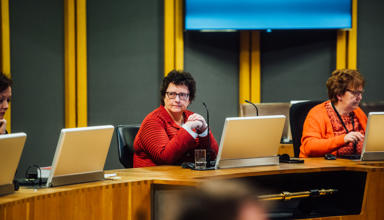Today's Senedd is very different to the Assembly established in 1999. Then, it had no primary law-making powers and was not formally separated from the Welsh Government. Now, it raises taxes, makes laws and holds the Welsh Government to account in some of the areas which have the greatest impact on people's lives.
After 20 years, the Senedd has developed into a fully-fledged parliament.
In 2020 Members voted for a new law to:
- lower the voting age for Senedd elections to 16;
- change the name of the Assembly to Senedd Cymru or Welsh Parliament;
- name elected representatives "Member of the Senedd" (MS) or "Aelod o'r Senedd (AS)."
- change the law relating to disqualification from being a Member;
- enable qualifying foreign citizens to be able to vote in Senedd elections;
- allow for the Electoral Commission to be accountable to and financed by the Senedd for devolved elections.
Like all laws passed in the Senedd, the Act will be subject to further scrutiny to review how successful it has been.
Votes at 16 for Senedd Elections
16 and 17 year olds will be able to vote for the first time at the Senedd Elections in 2021 as part of the biggest change to the democratic process in Wales in half a century.
The proposal was recommended by the independent Expert Panel on Electoral Reform, following a public consultation. The consultation showed that 59% of people responding agreed that the voting age should be lowered to 16.
The Llywydd of the Senedd, Elin Jones MS said:
"Votes at 16 will empower our young people to participate in the democratic process and...is a powerful statement from the Senedd that we value their views.
It will strengthen our democracy for the twenty first Century and bring new energy to our democratic process."
Read the Llywydd's written statement
Welsh Youth Parliament
Creating a Parliament for Wales consultation
Learn more about votes at 16
Changing the Name of the Assembly to the Senedd
The Senedd and Elections Act changed the name of the Assembly to Senedd Cymru or Welsh Parliament, commonly known as the Senedd. The new name reflects the Senedd's constitutional status as a national parliament that takes decisions that impact the lives of all of us in Wales.
The Act was passed following a public consultation which showed that 61% of respondents agreed or strongly agreed that the Assembly should change its name.
Disqualifications
The Senedd and Elections Act changed the law on disqualification from being a Member of the Senedd and provided clarity for potential candidates about their eligibility to stand for election. It adjusted the point at which most disqualifications take effect, enabling more people to stand without having first to resign their jobs; instead they would need to resign only if elected.
To avoid conflicts of interest, the Act disqualifies members of the House of Lords, unless they take a formal leave of absence from Westminster. The Act also disqualifies local authority councillors from being a Member of the Senedd.
The new disqualification arrangements will take effect from the next Senedd elections in 2021.
Financing and Accountability of the Electoral Commission
The Electoral Commission is the independent body which oversees elections and regulates political finance in the UK. It is funded by and accountable to the UK Parliament. The Senedd and Elections Act provides for the Senedd to be responsible for the accountability and financing of the Electoral Commission for devolved elections.
Since the Senedd now has powers over devolved elections (local elections and Senedd elections), the Act established a duty on the Senedd to consider the financial and oversight arrangements for the work of the Electoral Commission, in relation to devolved Welsh elections and referendums.
Other changes
The Senedd and Elections Act made other changes to the Senedd's electoral and internal arrangements. These include:
- Extending the deadline for the first meeting of the Senedd after an election from seven to fourteen days.
- Clarifying that the Senedd Commission has the power to charge for services not related to its functions.
How did the Senedd and Elections Act become law?
The Act became law on 15 January 2020. As with all legislation, the Act was subject to the full legislative scrutiny processes. The Act required a "super-majority" at its final legislative stage (at least 40 Members needed to vote in favour).
Learn more about the scrutiny of the Act
Timeline
May 2020
The name of the Assembly formally changes to the Welsh Parliament, commonly known as the Senedd.
February 2020
The Senedd and Elections Act 2020 receives royal assent and becomes law.
November 2019
The Assembly gives its final approval to the Bill . 41 Members voted in favour.
February 2019
The Llywydd introduces the Senedd and Elections (Wales) Bill.
October 2018
Find out more about the Commission’s announcement.
The Assembly gave its approval to the Commission’s decision to introduce legislation to change the name of the Assembly, lower the voting age for Assembly elections to 16, and make other changes.
July 2018
The Assembly Commission announces its intention to introduce legislation to lower the voting age for Assembly elections to 16 and change the name of the Assembly.
December 2017
Expert Panel on Electoral Reform publishes its report, ‘A Parliament that works for Wales.’
June 2017
The Commission announces its decision to legislate to change the Assembly’s name following a consultation showing that 61% of respondents agreed or strongly agreed that the Assembly should change its name.
February 2017
The Llywydd announces the establishment of an Expert Panel on Electoral Reform, Chaired by Professor Laura McAllister, to provide impartial advice on the number of Members needed, the most suitable electoral system, and the minimum voting age.
July 2016
Members agrees unanimously that the name of the Assembly should reflect its constitutional status as a national parliament.







